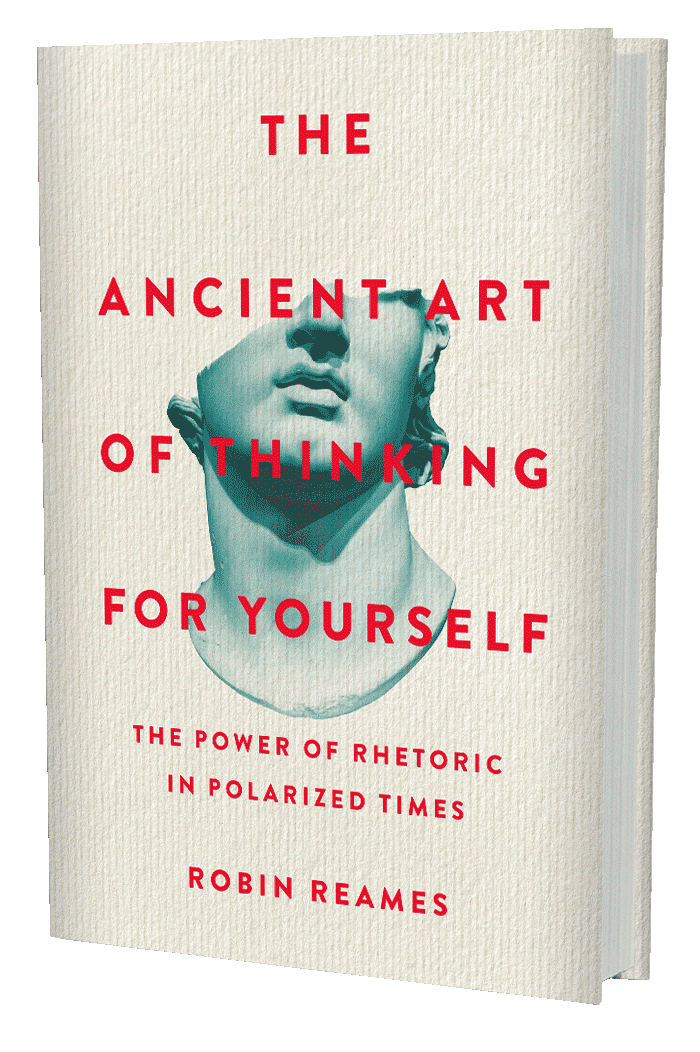Robin Reames — The Power of Rhetoric in Polarized Times
Manage episode 414960301 series 3346825
The discipline of rhetoric was the keystone of Western education for over two thousand years. Only recently has its perceived importance faded.
In this book, renowned rhetorical scholar Robin Reames argues that, in today’s polarized political climate, we should all care deeply about learning rhetoric. Drawing on examples ranging from the destructive ancient Greek demagogue Alcibiades to modern-day conspiracists like Alex Jones, Reames breaks down the major techniques of rhetoric, pulling back the curtain on how politicians, journalists, and “journalists” convince us to believe what we believe—and to talk, vote, and act accordingly. Understanding these techniques helps us avoid being manipulated by authority figures who don’t have our best interests at heart. It also grants us rare insight into the values that shape our own beliefs. Learning rhetoric, Reames argues, doesn’t teach us what to think but how to think—allowing us to understand our own and others’ ideological commitments in a completely new way. Thoughtful, nuanced, and leavened with dry humor, The Ancient Art of Thinking for Yourself offers an antidote to our polarized, post-truth world.

Robin Reames is associate professor of English at the University of Illinois at Chicago, specializing in rhetorical theory and the history of ideas. She teaches graduate and undergraduate courses in contemporary and ancient rhetorical theory, language theory, rhetorical criticism, political rhetoric, writing, as well as courses in literature and literary theory. Her research is guided by an interest in the visceral and primordial power of human speech, for which ancient rhetoric serves as a first theory. Her book, Seeming and Being in Plato’s Rhetorical Theory examines how Plato used rhetorical theory to forge the primordial distinction between seeming and being—the foundational fissure from which Western metaphysics emerged, and the very grounds of the opposition between true and false. Her new book is The Ancient Art of Thinking For Yourself: The Power of Rhetoric in Polarized Times.
Reames and Shermer discuss:
- What is rhetoric?
- How has rhetoric changed her life?
- Rhetoric vs. facts (rhetorical truths vs. empirical truths)
- Is the point of reason to understand reality or to persuade? (Hugo Mercier/Dan Sperber, The Enigma of Reason)
- Canons of rhetoric: invention, arrangement, style, memory, delivery
- “Through thinking rhetorically about our ideological commitments it is possible for people from radically different orientations to have different, better, and more productive conversation.”
- Logos (authority), pathos (feelings), ethos (ethics), hubris (pride)
- Bullshitters vs. liars
- What is reason?
- Induction and deduction
- What is truth?
- Can you reason people out of beliefs they didn’t reason themselves into?
- Thinking rhetorically rather than ideologically
- Thinking metaphorically: “war on poverty”, “government as family” (George Lakoff)
- Thought and language
- Thought, language, and ideology
- How language is processed (thoughts vs. pictures)
- How to disagree with people/debate hot issues (guns, abortion, immigration)
- Culture wars: war between two different cultures—liberal and conservative
- How to have impossible conversations
- Toulmin scheme: data, claim, warrant, backing, qualifier, rebuttal
- Facts and values
- Value hierarchy
- Warrant: linking data to a claim
- Syllogistic reasoning/deduction
- Conspiracy theories and why people believe them
- Birtherism and Trutherism.
If you enjoy the podcast, please show your support by making a $5 or $10 monthly donation.
28 פרקים





